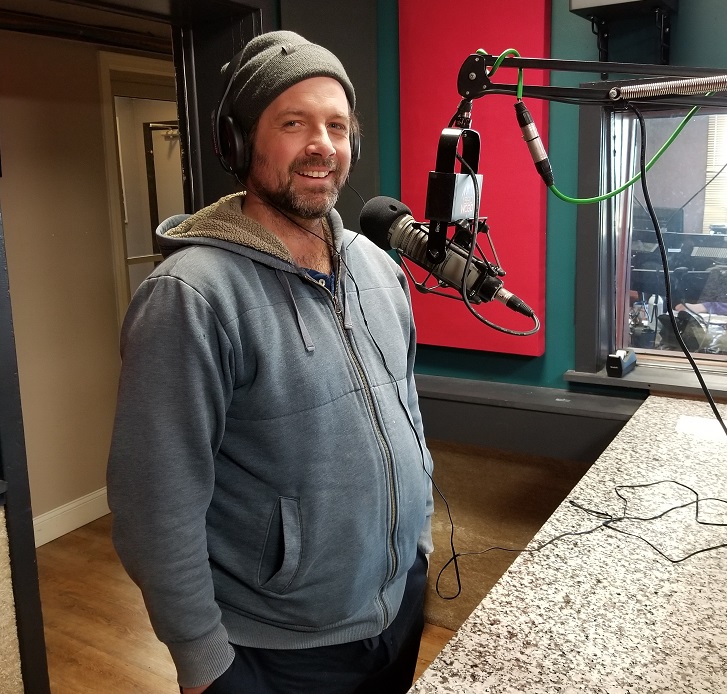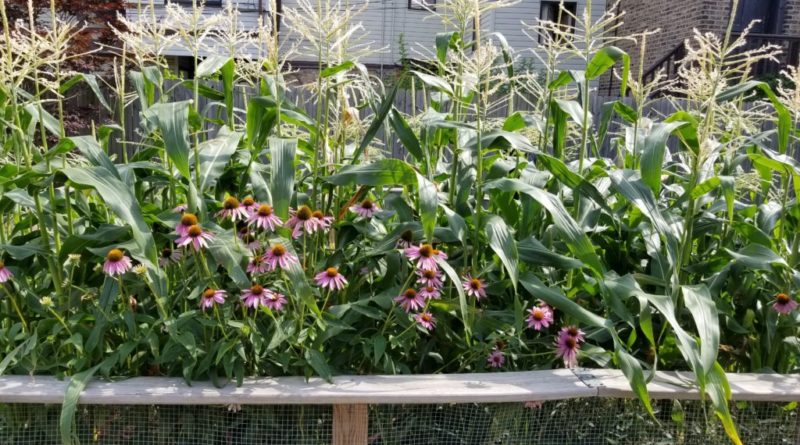Fluck Farms Chicago 2020
Podcast: Play in new window | Download (Duration: 1:34:35 — 45.2MB)
Subscribe: Apple Podcasts | Spotify | Android | iHeartRadio | Podchaser | Email | TuneIn | RSS | More
(January 26, 2020) We’ll get to sustainable seafood in just a second. Meanwhile, Justin Fluck (pronounced “Fluke”) is the man behind Fluck Farms Chicago. I met him last summer when I was judging gardens for the Chicago Excellence in Gardening Awards (CEGA). He had entered his garden/farm in the Avondale/Logan Square Neighborhood of the 33rd Ward. I say garden/farm because he’s on a double lot and his garden consists mainly of vegetables. Not everybody in the city has a double lot to work with, so he has an immediate advantage over most gardeners. However, he does most of his “farming” in about 500 square feet or so.
Regardless, the plot was immaculate and lush and healthy. In my description of the garden, I wrote that Justin
calls his exquisitely orderly garden a tribute to his father and grandfather, who taught him about growing things. There is a wide expanse of lawn on this double lot in Logan Square, but he wisely uses the chemical-free grass as mulch for his vegetables: tomatoes, peppers, lettuce, garlic, leeks, cucumbers, carrots, potatoes and a magnificent stand of two varieties of sweet corn–one early and one late. He even shelters a feral cat named Kiko, who keeps his yard rat free while living under his back porch. Best of all, Justin makes growing vegetables seem cool.
I don’t know about you, but being the coolest kid on the block because you grow vegetables is all right with me. We were hoping to bring him on the show the day after the awards ceremony in October, but he was too busy showing off his award to his parents, who were in town. Who can blame him?
So we rescheduled to today, which is prime time for planning the 2020 garden. I asked him if he’s combing through seed catalogues right now, and he responded this way.
I do use a seed catalog (partially– Jung– as not everything I grow is from seed) so I can talk about that and what I have planned. I will bring my planner where I sketch out my plan and list everything year by year.
To be honest I know very little about soil, but my dad raves about how rich and dark mine is, so can’t add much to that. I can however expand on the awards ceremony, what inspires me to grow more and different things (cooking, meeting people who grow different things) etc.
And isn’t that what gardening is all about? Personally, I’m thrilled to welcome Justin to the show this morning to talk about Fluck Farms Chicago. We love talking to experts on the show. However, sometimes experts get their knowledge from books and sometimes they get it from life. Justin falls into the latter category, which is fine with us.
The death of sustainable seafood
Whenever Dr. Nicolaas Mink, CEO and founder of Sitka Salmon Shares, appears on the show, I learn something new about sustainable seafood. We have been talking to him about his business for about three years. In fact, in full disclosure, they are an occasional sponsor of The Mike Nowak Show with Peggy Malecki. As I wrote when he last joined us in December of 2018,
 When you purchase fish through Sitka Salmon Shares, you’re becoming part of a CSF. If you’re not familiar with that acronym, it stands for Community Supported Fishery. It’s basically the same as a CSA–Community Supported Agriculture–but with fish instead of land-based farm food. And just like with CSAs, there are benefits to purchasing shares, just as there are challenges to both the consumer and the businesses. In the July 22 blog, I linked to the healthyish blog on the BonAppetite.com site, which outlined some advice about shopping for seafood. Some great advice.
When you purchase fish through Sitka Salmon Shares, you’re becoming part of a CSF. If you’re not familiar with that acronym, it stands for Community Supported Fishery. It’s basically the same as a CSA–Community Supported Agriculture–but with fish instead of land-based farm food. And just like with CSAs, there are benefits to purchasing shares, just as there are challenges to both the consumer and the businesses. In the July 22 blog, I linked to the healthyish blog on the BonAppetite.com site, which outlined some advice about shopping for seafood. Some great advice.
The backdrop for a conversation about seafood must start with climate change. Reuters has a terrific series of articles called Ocean Shock: The Climate Crisis Beneath the Waves, that helps put this into perspective.
We hope you’ll take the time to read at least some of that report. But what caught our eye recently was another article, this one written by Dr. Mink himself, in The New Food Economy. It was titled, In Memoriam: Sustainable Seafood, 1992-2019. Here’s part of what he had to say.
After decades of flourishing as the North Star for fisheries managers, activist consumers, and, even corporate America, sustainable seafood fell victim to climate change in the Gulf of Alaska. There, on December 6, in one of the best-managed fishing grounds the world has ever known, biologists declared that there weren’t enough Pacific cod to sustain a fishery. The water had simply become too warm for cod to reproduce.
The closing of that fishery, no matter how long it lasts, should end all doubt that sustainable wild harvested fisheries are environmental fictions that no longer serve utility in the era of climate catastrophe. (This op-ed, and its claims, focuses strictly on wild-harvested fisheries. It make no claims about aquaculture or farmed fish, which, too, will face new realities with climate change, only different ones that are beyond the scope of this op-ed.)
He notes that the idea of sustainable fishing began in earnest on July 2, 1992. That’s the day that the Canadian Government closed the Grand Banks in the North Atlantic to cod fishing, sending shock waves through the industry. That decision brought about significant changes. They didn’t solve the problem of overfishing, but they at least addressed it. However, a mere two decades later, climate change is having the last say.
As ocean conditions change radically before our eyes, sustainable seafood’s baseline scientific assumptions are unraveling at a speed that makes the rise of the maritime technology that annihilated fish in the postwar era appear glacial. Models for ocean productivity, surface sea temperature, and fish distribution and recruitment that powered the predictive analyses that made sustainable management possible are increasingly susceptible to significant flaws, if not downright failure. In this world, managing fisheries for long-term sustainable yield or for some minimum biomass threshold is increasingly impossible. The closure of the Federal Gulf of Alaska Pacific cod fishery is case in point.
Just a few days later, an issue that Mink discussed the last time he was on our show was again making headlines. It concerns a proposal to create something called Pebble Mine in the Bristol Bay area of Alaska. National Geographic explains.
The proposed Pebble Mine has made international headlines for years, in part due to the heated opposition it has ignited in the Bristol Bay region. The area is home to the largest sockeye salmon fishery left in the world, employing more than 14,000 people and generating around $1.5 billion each year in revenue. Opponents fear that mining the Pebble deposit, which sits at the headwaters of two of the most important salmon-producing rivers in the region, would pollute the waters and destroy the species’ habitat. Pebble officials maintain it would not have a significant impact on the fish.
Can I ask a rhetorical question? Why do the mining and oil and gas and logging companies always say things like that? Like I said, the question is rhetorical. On December 20 of 2019, CNN reported that Alaska Governor Mike Dunleavy was working in secret to get the mine approved.
Gov. Mike Dunleavy’s office was given detailed talking points, ghostwritten letters and advice on lobbying strategies by Pebble Limited Partnership executives, emails show. Dunleavy and his office then used that material, sometimes adopting the company’s language word for word, in an effort that culminated in President Donald Trump promising favorable action on the mine, according to emails.
One striking example of the governor using Pebble’s language is an official letter Dunleavy sent to the U.S. Army Corps of Engineers in April about the length of a public comment period on the mine’s draft environment impact statement.
The emails show that Dunleavy’s letter was a verbatim copy of a draft sent to his aide by Pebble’s chief of staff, except for a few phrases.
A blogger for the Natural Resources Defense Council (NRDC) went so far as to call Gov. Dunleavy “A Puppet for the Pebble Mine.”
Regardless, Sitka Salmon Shares just announced that it is entering its 10th CSF Season. We’ll ask Nic Mink what’s new. We won’t ask him what’s fresh, because all of their fish is fresh. Just sayin’.


